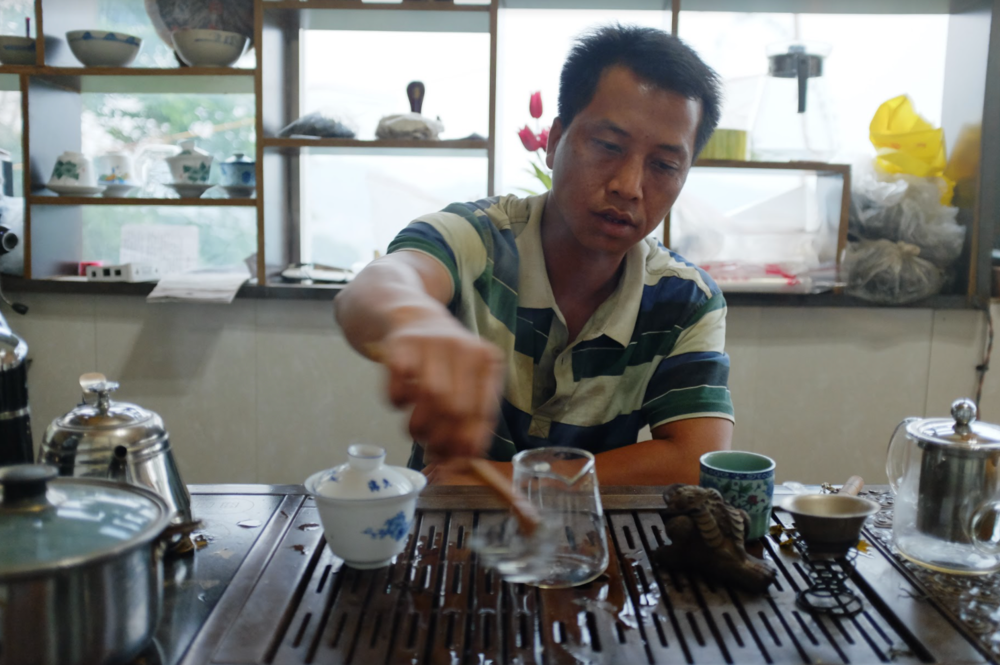Can tea really get us “drunk?” It’s a question we get asked frequently given our name. In Chinese culture, the term “drunk” is a romantic expression used to describe one’s indulgence in true passion. You could be drunk by starlight; or the intense beauty of the sun setting over a mountain range; or like Beyonce, you could be Drunk in Love.
But, there are some real psychoactive effects we get when drinking tea that give us a feeling of a mildly altered state. The effect of getting ‘tea drunk’ can be the result of multiple factors, and depending on the individual it can be one or a combination of all of them.
Caffeine and Theanine
The first and probably most expected is the effect caffeine has on humans. All true tea comes from the camellia sinensis plant, which has caffeine in the leaves. In tea, caffeine stimulates us, gives us energy, and can makes us hyper.
Another compound in tea called theanine, is known to calm our nerves and relax us. It’s an amino acid, that effects our brain chemistry by increasing GABA production and our levels of serotonin and dopamine.. Combined with the caffeine this gives us a blissful, elated feeling. The theanine increases our alpha brain wave activity, which is what causes the clear mind, almost meditative sensation in tea. It’s a key factor for the relaxed but alert feeling we often feel with tea.
Since ancient times, many tea drinkers report joyfulness when drinking tea and it’s believed to be theanine and its effect on our brain that contributed to this feeling. Many believe that the reason tea became so wildly popular in ancient China was due to the pleasant psychoactive effects, many of which are due to the theanine compound.
When we talk about the most desired bodily effects of tea, we’re searching for a focused and clear mind, paired with a calm body. Similar to the accounts of ancient time, this balance of mind and body brings an elated sense of joy to our souls. This element of joy, can be related to how many people romanticize being tipsy (caffeine and theanine are not compounds that alter us nearly as much as say alcohol). When you’re at that level of joy and elation, everything around you starts to just feel a little more blissful.
Tea on an Empty Stomach
Tea is slightly alkaline, not pH neutral. Because of this, drinking tea on an empty stomach, or if an individual has a sensitive stomach, one can feel slight discomfort. Everyone has varied levels in their stomachs, so this tends to be a pretty rare reaction.
The polyphenols in tea catechin can lower one’s blood glucose. We have another article about a specific polyphenol, tannins, that you can read here. Lowering blood glucose in this way is commonly viewed as a health benefit of tea. But, for those who already have low blood sugar or haven’t eaten much, the polyphenols can cause dizziness and even make one feeling incoherent. The levels of catechins in tea varies from tea to tea.

Combine These Facts and You’re Drunk
The combination of excitement, joyfulness, potential for upset stomachs and dizziness create a feeling similar to the drunk we feel from the familiar drunkness of alcohol. Depending on the individual, some might only experience the positive aspect of tea drunk and some the opposite. And similar to drinking alcohol, sometimes the earlier part of tea drunkenness is pleasant, like being tipsy, and then can be taken a bit overboard.
But unlike alcohol, tea does not alter your motor skills, lead you to making choices you may not when sober, or lead to forgetfulness or hangovers. This sensation of “drunk” people talk about with tea is infinitely more mild than anything alcohol creates.
What Teas Are More Likely to Get You “Drunk”
If you’re after the feeling of “tea drunk” you’ll want to seek out teas that are high in all the psychoactive compounds we outlined above. Teas that are high in catechins, caffeine, and theanine. It is known that buds hold higher levels of caffeine and theanine, so choosing teas that are bud heavy like the White Tea, Bai Hao Yin Zhen (Silver Needle), could be a source of positive ‘tea drunkness’ to explore. Catechins are usually found in higher quantities is less oxidized teas, like Green Teas and Sheng Pu Er Teas. Gua Pian is a green tea made using only leaves with a unique La Da Huo step in the processing. This gives the tea a pleasantly toasty flavor that compliments its grassy umami taste, buttery mouthfeel and bold sugary undertone.
Have you been tea drunk with us before? Let us know about your experiences in the comments!

